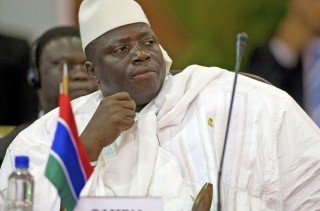In what was a surprise move last week Friday, Gambia’s decades-old dictator Yahya Jammeh decided to step down after losing in the Presidential election held across the tiny West African country last week. After news emerged that opposition candidate Adama Barrow had won the election with 45.5% of the total votes, Jammeh called to congratulate him. However, Jammeh seems to have changed his mind exactly a week later.
After the euphoria of having an African Dictator step down from office willingly after losing at the Presidential poll, emotions seem to have come back to ground zero. Jammeh announced on State TV yesterday that he’s rejecting the outcome of last week’s election and would not be stepping down, while also calling for fresh votes. His reason? Mistakes were made by the electoral commission, hence, he, Jammeh “rejects the votes in totality.” He admitted just last week that the election was free and fair, and that “the people had chosen.”
Analysts, after initially expressing high hopes for the future of the country’s democracy, have called this a setback. The sudden grace that Yahya Jammeh seemed to find to concede defeat last week and then call his replacement to wish him well was unprecedented in Africa. Adama Barrow, in turn, over the past week has made public his intentions, on assuming his role as president, to call for investigations into human rights abuses perpetrated by Yahya Jammeh over two decades in Gambia. He also vowed to halt Gambia’s withdrawal from the ICC. These have been attributed as reasons for Jammeh’s change of mind.
After more than two decades as Gambia’s leader, calls for investigations into Human rights abuses would have elicited a change of mind from any African dictator. Along with Gambia’s withdrawal from the International Criminal Court (ICC) in October, Jammeh also clamped down on opposition members before elections, arbitrarily arrested Gambians and members of the press, exited the commonwealth, while also surviving two coups attempts suspected to have been orchestrated by him all in his 24 years reign.
Barrow’s words were ill-timed and tactless, considering he is still technically a president-elect and successor to one of Africa’s longest dictators, and not yet the president. While this looks like some sort of “exculpation” for changing his mind, Jammeh’s recent decision has been seen as a ploy to work out an arrangement or lessen the severity of his punishment, as many analysts mentioned earlier today.
The Economic Community of West African States (ECOWAS) and the African Union already expressed their satisfaction with last week’s election results. Any other power play by Jammeh would be seen as an affront on their regional influence. Simone Gbagbo and Hissene Habre’s cases with the ICC are examples of how stubborn dictators end up in modern times.
However, as much as Gbagbo, Hibre, Charles Taylor are examples of African dictators who are having or had sad endings to their African “bigmanship”, there are also other stories that prove if a Dictator stubbornly digs his heels in, he might just get to stay beyond election period. Joseph Kabila has managed to delay elections in the Democratic Republic of Congo for some months now. Pierre Nkurunziza cemented his legendary status in the halls of African “big boys” after Burundi’s presidential elections last year, while holding off challenges from the AU, the East African Nations bloc, and the United Nations. Robert Mugabe, despite elections over the years in his country and the draft of protests in Zimbabwe earlier this year, is still President of the nation.
Analysts seem to forget these Dictators still have the “repressive State apparatus” at their disposal. Barrow’s announcement of investigations into Human rights abuse didn’t take into account that many of the Gambian Army’s top brass would also be implicated in any of such investigation. Jammeh came in through a military coup, secured his position through the army, admitted defeat because of the army, but now could soon return because of the army. Jammeh promoted 49 Army officers last week in an elaborate ceremony. And after yesterday’s announcement, there are reports that all means of communication including phone lines, social media and Television stations have been shut down, while soldiers have been stationed in every major district of the country.
Hence, explaining away Jammeh’s change of mind and reducing it to “trying to negotiate a better deal” is just plain redundant. We are inadvertently trying to rationalize human rights abuse by African dictators, and trying to help them escape standing trial for it. Attacks on Democracy, such as this, should be condemned in the strongest terms and be considered archaic and repressive. The ECOWAS, West Africa’s regional power would surely be in the best position to nip this in the bud before it gets out of hand. Signs, however, prove it might be too late and that, once again, the people will suffer for it.








